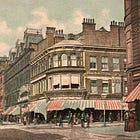How to train a pickpocket
Could you make it as a Victorian ‘breech buzzer’? This is how Manchester’s wiliest pickpockets learned their trade
One of the most notorious characters in the slums of Victorian Manchester was best known by her nickname — Cabbage Ann.
She had an unusual but important job in the grimy backstreets of the city.
Cabbage was a thief trainer who spent her days educating pickpockets at her very own school of crime.
In her lodging house in Charter Street, around a dozen lads were continually at work trying to graduate as “breech buzzers” as pickers of pockets were known.
A journalist keen to get a glimpse of Cabbage slipped into her kitchen one afternoon and was shocked to find himself surrounded by half of the city’s criminals, who were attending wake for one of her most prized lads.
“A member of the fraternity, eminent as a pickpocket, had died and the wake was being held with all due honours,” he wrote.
Cabbage puffed on her pipe and eyed him suspiciously through rank tobacco smoke before he managed to escape unharmed.
While Cabbage kept her training methods a closely guarded secret, another Manchester thief trainer did spill the beans on his dark art.
A reporter from the Empire News touring the slums one night in search of adventure managed to convince a man “with a hooked nose, hairy face, bent back and a long coat” to “initiate him into the training of pocket pickers”.
The daring reporter was taken into a nearby house where the windows were boarded up.
“I’ve turned out some sharp lads in my time,” the thief trainer told him. “First-raters are scarce I tell you — for a lad who is sharp with his fingers is born that way.
“You can’t make him, no matter how you try. You can improve a duffer, but a crack is born a crack.”
The thief trainer took the reporter into a room lit by two gas jets and explained his rigorous training regime.
“First of all, a pickpocket must learn to step quietly,” he said. “A lad must creep as quietly as a mouse.”
The boys being trained up needed to be able to creep around even in a pair of wooden-soled clogs so that “the sharpest ear on Earth couldn’t hear him”.
The trainer said he would then fill the floor of the room with stones and bits of broken pottery to make the task it even harder.
Only those who passed that test would be allowed anywhere near a pocket.
The reporter was then taken into the next room where he was stunned by what he saw.
There, hanging from a beam in the ceiling, was a life-sized and fully-clothed dummy of a man.
The trainee thieves who passed the walking test had to pick an item from every pocket without the dummy moving an inch.
Only the very few who succeeded were given a chance to pick the trainer’s pocket. To make it more realistic he wore a long top coat.
The trick was to “fan” the pockets first — passing a light hand over them quickly to test if there was anything worth pinching.
To steal from a hip pocket, another member of the gang would press on the victim’s opposite shoulder while the thief slipped a hand in and out of the pocket in less than a second.
“The first thing I taught a lad to sneak was a pocket handkerchief until he could pull it out quietly from under a man’s nose,” the man said.
“Next it was purses and watches.
“But the real skill is cutting out pockets. That’s a fine game and you must be as quiet and careful about it as you would it you tried to pluck a hair from a tiger’s whiskers when he was asleep.
“It’s only one in a thousand can do it.”
The expert thieves sent out into the streets of Manchester by these thief trainers developed their own style and worked their own hunting grounds.
Among the favoured spots was Victoria Station as passengers were trying to board packed trains.
Henry Watson, who hunted his prey on the platforms, disguised himself as a smartly dressed commuter with a coat slung over his arm as a prop.
‘The real skill is cutting out pockets. That’s a fine game and you must be as quiet and careful about it as you would it you tried to pluck a hair from a tiger’s whiskers when he was asleep. It’s only one in a thousand can do it.’
— A Manchester trainer of pickpockets
Mary Davies had a different style — wearing a large cape from under which she stole ladies’ purses.
She was sentenced to 15 months after she was spotted dropping a purse on the station concourse and trying to flee outside with the cape flapping behind her.
John Smith was less sophisticated in his approach — barging into his victims while trying to yank their watches from their chains.
When he was caught by police on a robbing spree in Buxton, he tried to swallow his return train ticket to Manchester to prevent them from discovering where he had come from.
Manchester Racecourse, where horse races were watched by crowds of up to 50,000 people, many of them drunk, was another good hunting ground.
When three “respectably dressed” thieves named Thomas William, Edward Morris and William Harrison were arrested there they feigned innocence.
But a court heard they had 29 convictions between them. Harrison was the “worker” while the other two were the “coverers” who helped him to pinch.
Other pickpockets such as Elizabeth Flannagan, described by police as a professional, worked their trade in the large shops in and around Market Street.
A court heard she was so skilled she could steal several purses in just a few minutes before leaving a shop before anyone noticed.
In 1867, Cabbage Ann was also finally hauled before the courts after police had been trying for months to take Manchester’s most notorious pickpocket trainer out of action.
A constable named Plumb raided her lodging house on a Friday night and found a milkman’s stolen overcoat in the cellar.
The game appeared to be up, but old Cabbage had other ideas.
Sitting in the public gallery was one of her students, a boy aged 13 named Michael Crane, who was watching the case.
Cabbage pointed Michael out to the judge — claiming he had stolen the coat — and he was later tried and sent to a reformatory school for five years.
It was a lucky escape for his teacher, but the judge warned her she faced being locked up one day.
“You’re a regular trainer of thieves and one of the wort women in Manchester,” he said.
“I’ll take every care to help the police in every possible way to get you transported as soon as possible.”
But he never got his wish.
“I want justice,” Cabbage Ann shouted with fake outrage as she left the dock and headed back to her boys.
Talking football
Whichever football team you support, whether you’re a Red or a Blue, I hope you have a good FA Cup Final day today.
If you want something to do before the match kicks off, you could listen to a new podcast episode about Manchester’s two great clubs.
I’ve been working on the podcast, which is called Everything But A Beach, with my two friends Yakub Qureshi and Chris Osuh for the last nine months.
It is named after a famous quote about Manchester by the Stone Roses singer Ian Brown and it takes an off-beat look at the city’s history.
In the latest episode, the second part of which will be published this morning, you can hear about the origins of United and City and how Manchester helped to shape world football.
We’ve also published a story on the Victorian Manchester scuttling gangs, which some of you will know is one of my favourite parts of Mancunian history.
It tells you everything you’ll need to know about how the gangs were formed, how they fought, what they wore and even their tattoos.
The third episode we’ve published so far is about one of the most unusual characters in Manchester’s history, the hangman Albert Pierrepoint.
The three of us will be appearing at the upcoming Manchester Histories Festival when we’ll talk about the new podcast in an open mic session at Central Library on Saturday 8 June.
Then, on Sunday 9 June, I’ll be appearing at the festival’s Celebration Day at the University of Manchester’s Whitworth Hall, where I’ ll be selling signed copies of my Angel Meadow book as well as tickets for my walking history tours.
Please do come and say hello at my stall if you are at the Celebration Day. It will be nice to chat and say hello.
If you want to join more than 200 people who have already been on one of my Angel Meadow tours, I still have some tickets available for June and July available on this link.
Have a great day and enjoy the football!











So there actually were people like Fagin in the real world.
I’m curious though… did any of the sources indicate what the pickpocket teachers got out of the arrangements? I’m assuming a big piece of the action, but I was wondering how much?